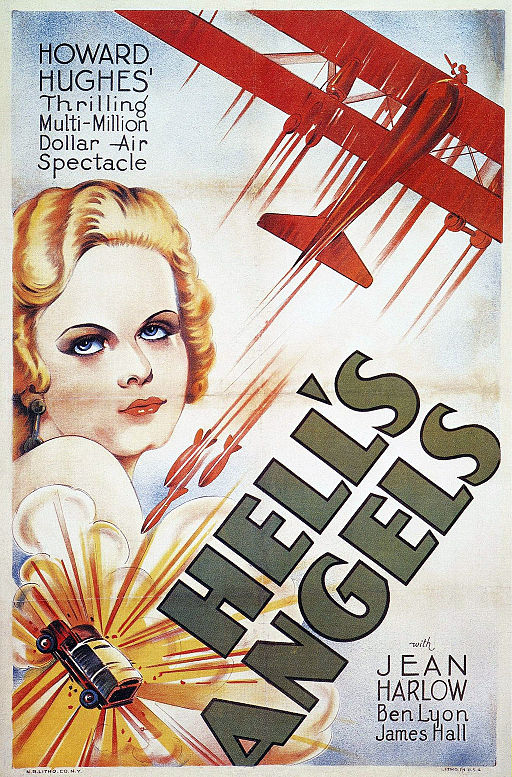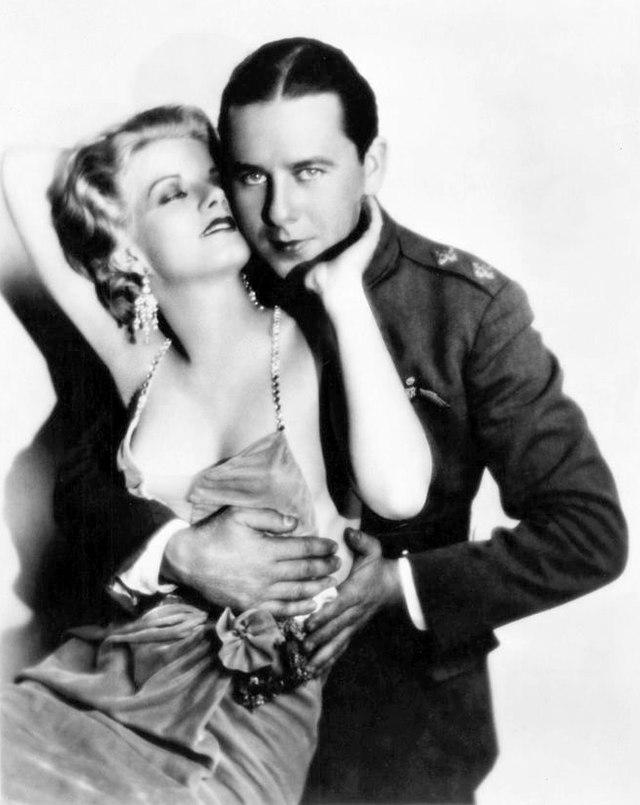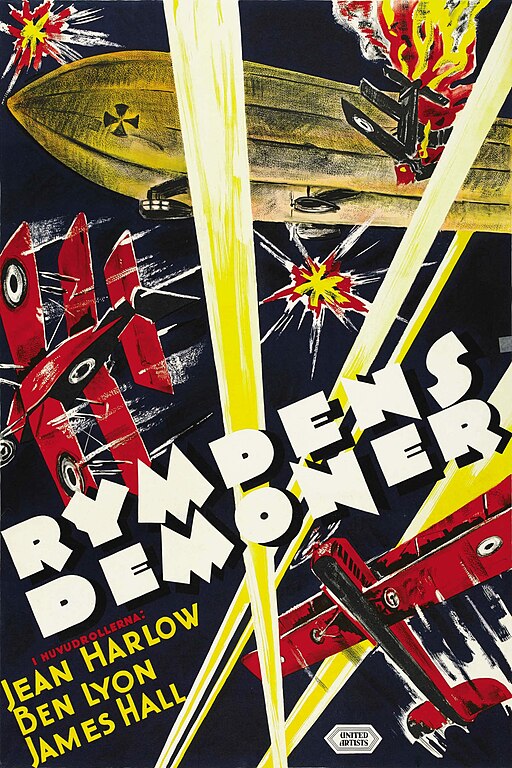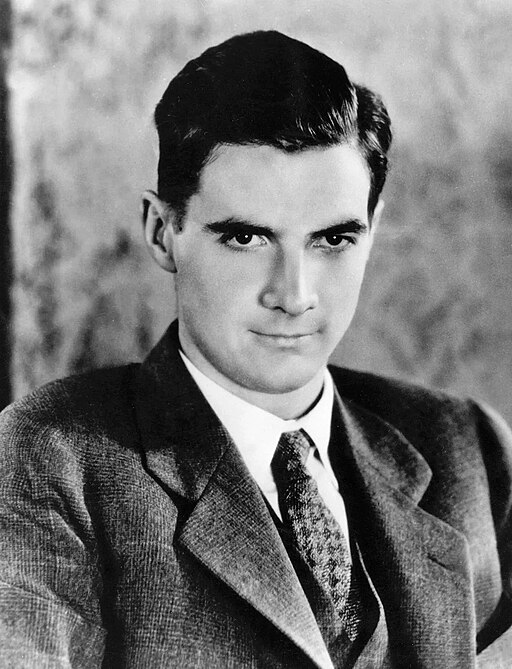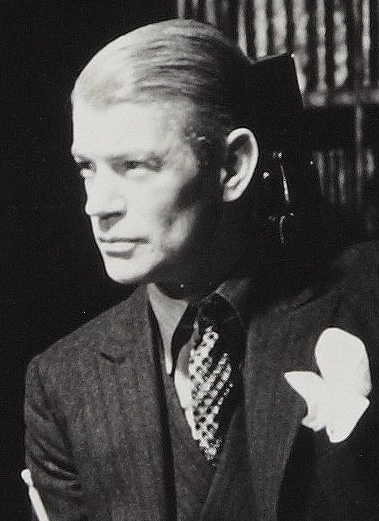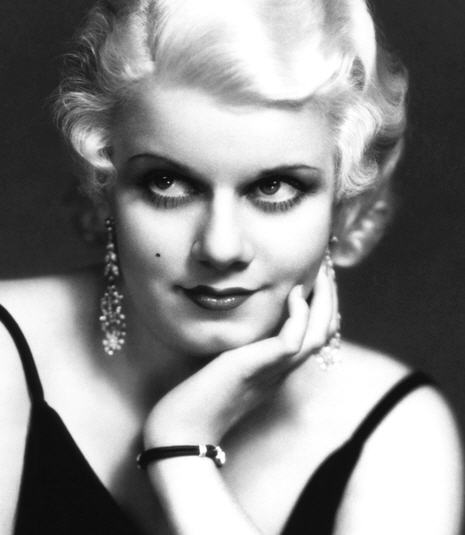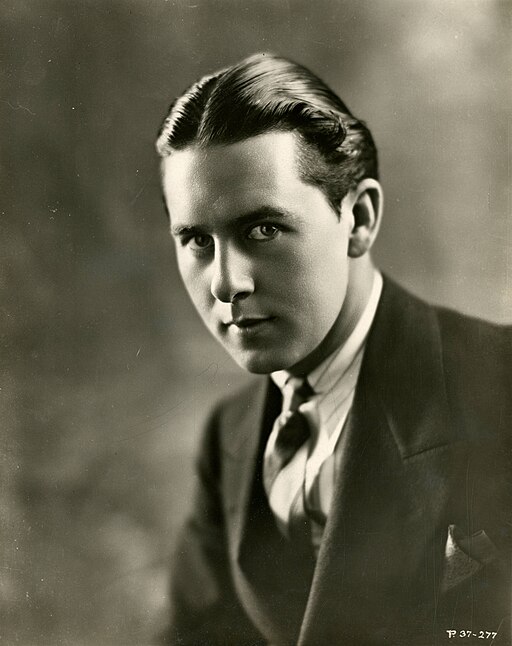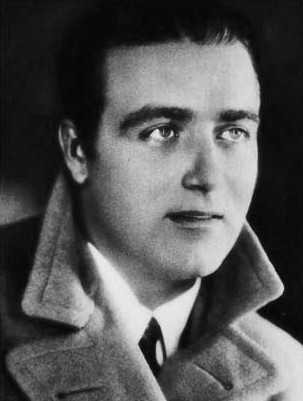Hell's Angels - 1930
back| Released by | United Artists |
| Director | Howard Hughes (primary), James Whale (uncredited for directing dialogue sequences) |
| Producer | Howard Hughes |
| Script | Written by Harry Behn and Howard Estabrook - Story by Marshall Neilan and Joseph Moncure March |
| Cinematography | Tony Gaudio and Harry Perry |
| Music by | Hugo Riesenfeld |
| Running time | 131 minutes |
| Film budget | $2.8 million |
| Box office sales | $8 million |
| Main cast | Ben Lyon - Jean Harlow - James Hall |
Hell’s Angels
A Groundbreaking World War I Epic
"Hell's Angels" (1930), directed by Howard Hughes, is a pioneering World War I epic focusing on the lives of brothers Roy and Monte Rutledge, and their entanglement with a seductive woman, Helen.
The film is celebrated for its groundbreaking aerial combat sequences, which used real aircraft and daring stunts to achieve unprecedented realism. Hughes' insistence on authenticity and technical innovation set new standards in filmmaking, particularly in action and war genres.
Despite production challenges and delays, "Hell's Angels" became a commercial success, introducing Jean Harlow as a major star and leaving a lasting legacy in cinematic history.
Related
Hell’s Angels – 1930
Summary and Analysis
Summary:
"Hell's Angels" is a war film set during World War I, focusing on the lives of two brothers, Roy and Monte Rutledge, and their tumultuous relationships and experiences in the Royal Flying Corps.
Plot Summary:
- Introduction to Characters:
The film begins with the introduction of the Rutledge brothers. Roy (James Hall) is the more serious and dutiful of the two, while Monte (Ben Lyon) is carefree and reckless. Both attend Oxford University, where they meet their mutual love interest, Helen (Jean Harlow).
- Love Triangle:
Helen, a beautiful and flirtatious woman, attracts both brothers. Although she seemingly favors Monte due to his daring nature, she engages in a relationship with Roy, creating tension between the brothers.
- War Breaks Out:
As World War I erupts, both brothers enlist in the Royal Flying Corps. Their training and subsequent missions highlight the stark differences in their characters. Roy is committed and brave, while Monte is initially reluctant and fearful of combat.
- Combat and Sacrifice:
The film’s aerial sequences are some of the most spectacular and technically impressive scenes, showcasing intense dogfights and bombing raids. The brothers undertake a dangerous mission to bomb a German munitions depot. Monte’s fear puts the mission at risk, but Roy’s determination ensures its success.
- Capture and Dilemma:
During a later mission, the brothers are shot down and captured by the Germans. Facing the threat of torture for information, Roy devises a plan to kill Monte to prevent him from divulging any secrets under duress. Monte reluctantly agrees, showing his first act of bravery and loyalty to his brother.
- Tragic Conclusion:
Roy shoots Monte to protect their comrades and the mission. Shortly after, Roy himself is killed. The film ends with a poignant reflection on the futility and sacrifice of war, underscored by Helen’s realization of her superficiality and the brothers’ ultimate acts of heroism.
Analysis:
Themes:
- The Horrors of War:
"Hell's Angels" vividly portrays the brutality and chaos of World War I. The film's groundbreaking aerial combat scenes underscore the perilous nature of air warfare, emphasizing the high stakes and frequent loss of life.
- Brotherhood and Sacrifice:
The relationship between Roy and Monte is central to the film. Their bond is tested by war and their love for Helen, culminating in Roy’s ultimate sacrifice to protect his brother and their mission. This theme is a powerful exploration of familial loyalty and the personal cost of duty.
- Love and Betrayal:
Helen represents the emotional conflict in the film. Her fickle nature and superficial relationships with both brothers add a layer of personal betrayal and tragedy. Her character’s development from a carefree flirt to a remorseful woman mirrors the loss of innocence experienced by many during the war.
Technical Achievements:
Aerial Sequences:
Howard Hughes’ obsession with authenticity led to some of the most remarkable aerial scenes ever filmed at that time. The use of real aircraft and daring stunts, including crashes and dogfights, provided a visceral and realistic depiction of air combat, setting new standards in filmmaking.
Cinematography:
The work of Tony Gaudio and Harry Perry was instrumental in capturing the film’s dynamic and visually stunning aerial shots. The use of innovative camera techniques and aerial photography added to the film’s realism and impact.
Sound and Music:
As one of the early sound films, "Hell's Angels" made significant use of synchronized sound effects, particularly in the combat scenes. Hugo Riesenfeld’s score complemented the film’s dramatic and emotional arcs, enhancing the overall experience.
Cultural Impact:
- "Hell's Angels" is notable for its high production costs and Hughes' relentless pursuit of perfection, which led to delays and extensive reshoots. Despite these challenges, the film was a commercial success and remains a landmark in early sound cinema.
- The film also marked the screen debut of Jean Harlow, whose performance and iconic line, "Would you be shocked if I put on something more comfortable?" became a defining moment in her career and in Hollywood history.
Movie Premiere Hell's Angels 1930:
Full Cast:
· Ben Lyon as Monte Rutledge
· James Hall as Roy Rutledge
· Jean Harlow as Helen
· John Darrow as Karl Armstedt
· Lucien Prival as Baron Von Kranz
· Frank Clarke as Lt. von Bruen
· Roy Wilson as Baldy Maloney
· Douglas Gilmore as Leutenant 'Red' German Pilot
· Jane Winton as Frau Minna Von Kranz
· Wyndham Standing as British Major
· Fay Holderness as Plump German Woman
· Stephen Carr as Reggie
· William B. Davidson as Dr. Saunders
· Wilfred Lucas as Parson
· Evelyn Hall as Monte's Dance Partner
· Bertram Marburgh as German Sergeant
· Nigel De Brulier as French Farmer
· Michael Visaroff as French Café Manager
· Toto Karaca as French Girl in Café
· James Finlayson as Attendant (uncredited)
· Carl von Haartman as German Officer (uncredited)
Innovative Direction of Howard Hughes:
Visionary Ambition: Howard Hughes' direction of "Hell's Angels" is characterized by his grand ambition and perfectionist approach. Hughes, a billionaire aviator and businessman, was determined to create an epic war film that would stand out for its realism and technical prowess. His commitment to authenticity and spectacular visuals drove the film’s production, leading to some of the most innovative and daring cinematic techniques of the time.
Authenticity in Aerial Combat: One of Hughes' most significant contributions to the film was his insistence on authenticity in the aerial combat scenes. He went to great lengths to achieve realistic dogfights and bombing raids, employing real aircraft and skilled stunt pilots. Hughes himself was involved in many of the stunts, risking his life to capture the perfect shot. This dedication resulted in some of the most breathtaking and realistic aerial sequences ever filmed, setting a new standard in cinema.
Technical Innovation: Hughes' direction pushed the boundaries of filmmaking technology. He utilized multiple cameras to capture different angles of the aerial battles, ensuring dynamic and immersive visuals. His pioneering use of aerial photography, combined with innovative camera techniques, brought a level of realism and excitement that was unprecedented. The film's technical achievements were groundbreaking and influenced the future of action and war films.
Attention to Detail: Hughes' meticulous attention to detail extended beyond the aerial sequences. He was heavily involved in every aspect of production, from set design to costume accuracy. This attention to historical detail added depth and authenticity to the film, enhancing its overall impact. Hughes’ perfectionism often led to delays and reshoots, but it also ensured that every element of the film met his high standards.
Dramatic Storytelling: While known for his focus on technical excellence, Hughes also demonstrated a strong sense of dramatic storytelling. He effectively balanced the epic scale of the war scenes with intimate character moments, exploring themes of bravery, sacrifice, and the psychological toll of war. The love triangle between Roy, Monte, and Helen added a personal dimension to the story, making the characters’ experiences more relatable and poignant.
Direction of Actors: Hughes’ direction of the actors was notable for its intensity and demand for natural performances. Jean Harlow’s portrayal of Helen was a standout, with Hughes guiding her to deliver one of her most memorable performances. His direction brought out the nuances in the characters, particularly in the emotional and morally complex scenes involving the Rutledge brothers.
Challenges and Overcoming Obstacles: The production of "Hell's Angels" faced numerous challenges, including accidents, technical difficulties, and the transition from silent to sound film. Hughes’ perseverance and willingness to overcome these obstacles demonstrated his determination to achieve his vision. His adaptability in incorporating sound technology midway through production showcased his innovative spirit and commitment to staying at the forefront of cinematic advancements.
Impact on Cinema: Howard Hughes' direction of "Hell's Angels" left a lasting impact on the film industry. The film’s success demonstrated the potential of high-budget, technically ambitious projects, encouraging other filmmakers to pursue similarly grand visions. Hughes’ influence extended beyond this film, as his innovative techniques and dedication to realism became benchmarks for future war and action films.
Conclusion:
Howard Hughes’ direction of "Hell's Angels" is a testament to his visionary ambition, technical innovation, and commitment to authenticity. His meticulous attention to detail and willingness to push the boundaries of filmmaking resulted in a landmark film that set new standards in aerial cinematography and realistic combat sequences. Hughes’ ability to balance epic war scenes with intimate character moments created a compelling and emotionally resonant narrative, solidifying "Hell's Angels" as a significant achievement in early sound cinema.
Great Performance of Ben Lyon:
Character Portrayal: Ben Lyon plays Monte Rutledge, one of the two central characters in "Hell's Angels." Monte is depicted as a carefree and reckless individual, contrasting sharply with his more serious and dutiful brother, Roy. Lyon’s portrayal of Monte is multifaceted, capturing both the charm and the flaws of his character.
Charming and Reckless: Lyon effectively conveys Monte’s initial charm and devil-may-care attitude. From the outset, Monte’s charisma is evident, making him a likable character despite his recklessness. Lyon’s natural screen presence and confident demeanor help establish Monte as a charismatic figure, which makes his character’s development more impactful as the story progresses.
Emotional Depth: As the film delves deeper into the horrors of war, Lyon’s performance becomes increasingly layered. He skillfully portrays Monte’s internal struggle with fear and bravery, especially in the intense aerial combat scenes. Lyon’s ability to convey anxiety and vulnerability adds a significant emotional depth to Monte’s character, making his journey from a carefree playboy to a war-hardened pilot both believable and compelling.
Dynamic Chemistry: Lyon’s chemistry with James Hall, who plays his brother Roy, is a crucial aspect of the film. The dynamic between the two brothers is central to the narrative, and Lyon captures the complexity of their relationship well. His interactions with Hall are filled with both camaraderie and tension, reflecting the underlying conflicts of loyalty, jealousy, and love. This relationship is particularly highlighted in scenes where their differing attitudes towards war and duty come to the fore.
Romantic Entanglements: Monte’s romantic entanglements with Helen (Jean Harlow) further showcase Lyon’s versatility as an actor. His flirtatious and often reckless behavior with Helen contrasts with the more serious nature of his brother’s affections. Lyon’s performance brings out the carefree yet ultimately doomed nature of Monte’s relationship with Helen, emphasizing the tragic elements of his character.
Heroic Transformation: One of the most striking aspects of Lyon’s performance is his portrayal of Monte’s transformation. Throughout the film, Monte evolves from a reluctant participant in the war to someone capable of great sacrifice. This change is poignantly depicted in the climactic scenes where Monte must confront his fears and ultimately agrees to a tragic act of bravery. Lyon’s nuanced performance in these scenes captures the essence of his character’s arc, highlighting themes of redemption and sacrifice.
Key Scenes:
Aerial Combat Sequences:
Lyon’s physical performance during the aerial combat scenes is notable for its intensity. His expressions and body language convey the sheer terror and adrenaline of air battles, adding a layer of realism to the film’s action sequences.
Emotional Confrontations:
The scenes where Monte grapples with his fear and guilt, particularly when discussing the war with Roy, showcase Lyon’s emotional range. His ability to shift from bravado to vulnerability is particularly effective in making Monte a sympathetic character.
The Climax:
In the film’s climax, where Monte is faced with the ultimate test of loyalty and bravery, Lyon delivers a powerful performance. His portrayal of Monte’s anguish and resolve in agreeing to be killed by his brother to protect vital information is both heartbreaking and heroic.
Notable Quotes from Hell’s Angels:
Monte Rutledge (Ben Lyon):
"Would you be shocked if I put on something more comfortable?"
This iconic line is delivered by Jean Harlow's character, Helen, and is one of the most memorable quotes in the film. It exemplifies her flirtatious nature and has become a classic line in cinema history.
Roy Rutledge (James Hall):
"I know it's asking a lot, Monte, but if we don't do it, who will?"
This line reflects Roy's sense of duty and determination, highlighting the gravity of their mission and the personal sacrifice required.
Helen (Jean Harlow):
"You know, the war will be over one day, and then what will happen to us?"
Helen's line encapsulates the uncertainty and fear of the future that many characters feel, emphasizing the personal stakes and emotional toll of the war.
Monte Rutledge (Ben Lyon):
"I can't do it, Roy! I'm scared!"
Monte’s admission of fear adds depth to his character and underscores the human aspect of war, showing that bravery often coexists with fear.
Roy Rutledge (James Hall):
"It's not about glory, Monte. It's about doing what's right."
This quote represents Roy’s moral compass and the ethical dimensions of their actions during the war, contrasting with Monte’s initially carefree attitude.
German Officer:
"You English flyboys think you're so brave. We'll see how brave you are when you're facing our guns."
This line from a German officer during an interrogation scene adds tension and illustrates the dangerous stakes faced by the protagonists.
Helen (Jean Harlow):
"Oh, Roy, I never really loved you. I just wanted to feel something."
Helen’s confession reveals her superficiality and the emotional emptiness that underlies her relationships, adding a layer of tragedy to the romantic subplot.
Monte Rutledge (Ben Lyon):
"If we get out of this alive, Roy, I'm going to be a different man."
Monte’s declaration of intent to change shows his character development and the transformative impact of his wartime experiences.
Roy Rutledge (James Hall):
"Sometimes, Monte, we have to make sacrifices for the greater good."
This line underscores the theme of sacrifice that runs throughout the film, highlighting the difficult choices the characters must make.
Classic Scenes:
Aerial Dogfights:
Description: The aerial combat scenes are the most iconic aspect of "Hell's Angels." These sequences involve spectacular dogfights between British and German aircraft. Howard Hughes' insistence on realism led to the use of actual planes and pilots, resulting in thrilling and highly dynamic action scenes.
Analysis:
- Realism and Innovation: The use of real aircraft and daring aerial maneuvers set new standards for film realism. Hughes employed multiple cameras to capture the action from various angles, creating a sense of immersion and intensity.
- Impact: These scenes are widely regarded as some of the most impressive aerial footage ever captured on film. They influenced the way aerial combat would be portrayed in future war films and remain a benchmark for technical achievement in cinema.
Zeppelin Raid:
Description: In one of the film's most dramatic sequences, a German Zeppelin is sent on a bombing mission over London. The tension builds as the crew prepares for the raid, and the subsequent attack sequence is filled with suspense and danger.
Analysis:
- Suspense and Drama: The buildup to the raid, including the internal dynamics of the Zeppelin crew, creates a palpable sense of tension. The sequence effectively conveys the threat of aerial bombardment and the bravery of those involved.
- Special Effects: The destruction wrought by the Zeppelin's bombs, combined with the eventual downing of the airship, showcases the film's innovative special effects and practical effects work, adding to the film's overall impact.
Monte and Roy's Final Mission:
Description: The climactic mission where Monte and Roy undertake a dangerous bombing raid on a German munitions depot is a pivotal moment in the film. The brothers face intense anti-aircraft fire and enemy fighters, highlighting their bravery and the high stakes of their mission.
Analysis:
- Character Development: This scene is crucial for the development of both Monte and Roy. Roy's unwavering determination and Monte's gradual acceptance of his responsibilities are vividly portrayed, adding emotional depth to the action.
- Tension and Sacrifice: The scene encapsulates the film's themes of duty, sacrifice, and the brutal realities of war. The brothers' eventual capture and the subsequent moral dilemma they face further amplify the dramatic tension.
Monte's Execution:
Description: Captured by the Germans, Monte and Roy are faced with the prospect of being tortured for information. Roy decides to shoot Monte to prevent him from being coerced into revealing secrets. Monte agrees, demonstrating his ultimate act of bravery and loyalty.
Analysis:
- Emotional Intensity: This scene is one of the most emotionally charged in the film. Ben Lyon's portrayal of Monte's fear and resignation, coupled with James Hall's depiction of Roy's anguish, makes for a powerful and heartbreaking moment.
- Themes of Loyalty and Sacrifice: The execution underscores the film's exploration of the themes of loyalty, brotherhood, and the personal costs of war. It is a poignant reminder of the harsh decisions that soldiers must sometimes make.
Jean Harlow's Iconic Line:
Description: Helen (Jean Harlow) delivers the famous line, "Would you be shocked if I put on something more comfortable?" while seducing Monte. This line has become one of the most memorable quotes in film history.
Analysis:
- Character Insight: This scene highlights Helen's flirtatious and manipulative nature. Harlow's delivery adds a layer of sophistication and allure to her character, making her a memorable femme fatale.
- Cultural Impact: The line and the scene have become iconic, cementing Jean Harlow's status as one of Hollywood's earliest sex symbols. It reflects the film's blend of romance and drama amid the backdrop of war.
Awards and Recognition:
Academy Awards (Oscars):
Despite its technical achievements and significant impact on filmmaking, "Hell's Angels" did not receive any nominations at the Academy Awards. The film was released before the establishment of categories specifically recognizing technical and special effects achievements, which it might have been considered for had they existed at the time.
National Board of Review (NBR):
Top Ten Films of 1930: "Hell's Angels" was included in the NBR's list of the top ten films of the year, recognizing its significant impact and popularity.
Retrospective Recognitions:
Over the years, "Hell's Angels" has been retrospectively acknowledged for its contributions to cinema, particularly in the areas of special effects and aerial cinematography. While these recognitions do not take the form of formal awards, they are significant in the film's lasting legacy and influence.
Impact and Legacy:
- The film is often cited in discussions about early advancements in sound and special effects in cinema.
- Howard Hughes' commitment to realism and technical excellence in "Hell's Angels" set new standards for action and war films.
- The aerial sequences are still studied and praised for their innovation and execution, influencing future generations of filmmakers.

